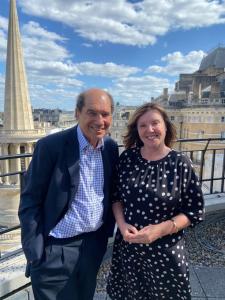‘Music can do so much for us, even in our most challenging times.’
The Children’s Commissioner recently spoke with Michael Berkeley as a guest on BBC Radio 3’s Private Passions programme, where she discussed her lifelong love of music, the transformative power music has had on children throughout her career, and why access to music is so important from an early age, and across all backgrounds.
The episode of Private Passions aired in full on Sunday and can be listened to on BBC Sounds. An extract is below.
Exposure to music
My own musical journey began when the ‘music man’ from the local authority came to my primary school to test our musical abilities. He placed a violin in my hands, and within just a few months, I was taking my first grades and performing in front of the school.
My mother became a dinner lady to help pay for my music lessons, and I was lucky enough to live down the road from a former violinist from the philharmonic orchestra, who taught me so well.
My early experiences with music helped instil the belief that everyone should have the same opportunity to access and develop their passions and skills. If you give a child the gift of music, they get a tool to explore parts of their identity.
Music sparking curiosity
Later, as a teacher I was able to see that music could be more than just a hobby for children – it had the power to spark passion. I vividly remember when my classroom was next to the music room, and I got chatting to one little boy who had recently arrived from Bangladesh. I was completely taken aback when he told me how much he loved the music of Schoenberg. He told me he had a small transistor radio in his bedroom, and he would listen to BBC Radio 3 every night. That moment was a stark reminder: curiosity isn’t dictated by postcodes, and access should never be dictated by where a child lives.
Music in my teaching career
Throughout my time as a headteacher, I worked in underperforming schools. On arrival I knew it was important to look beyond just the academics of the school. Too often I saw there was no life in a school – there was no sport, no music, no assemblies.
In one of my schools, the music teacher was a trained opera singer. I asked her to sing for the children – she was nervous given the school’s behavioural issues – but I knew I wanted the children to hear the beauty of her voice up close and personal. The children were transfixed.
A few years later, when I went on to lead a Trust of 14 schools across Norfolk and Suffolk, I knew music had to be a priority. I was determined to turn the underperforming schools around and show the children that anything could be possible.
We brought in a lecturer from the University of East Anglia after it closed its music department, and we made sure every Year 7 student had the chance to join the choir. By the time I left, we had string orchestras from the schools playing in Norwich Cathedral. These were once schools seen as ‘failing’, but now they were filled with children working together for the love of music and making their families proud.
Music brings beauty and strength
More recently, as Children’s Commissioner I have ensured that music remains part of my work – I’ve had children play music at the launch of The Big Ambition last year and at the Festival of Childhood earlier this year.
I know from visits and hearing from children in my national surveys that children love music. One instance that will always stick with me is speaking to a boy at a Young Offenders Institution, I asked when he was last happy, and he told me primary school and his love of music. We ended up singing together for half an hour.
This was once again a reminder of the power of music. Music can do so much for us, even in our most challenging times. Every child, wherever they live, whatever their background, should have access to music in their life – it can bring beauty and strength to their lives.
Listen to the full interview with Private Passions on BBC Sounds.




